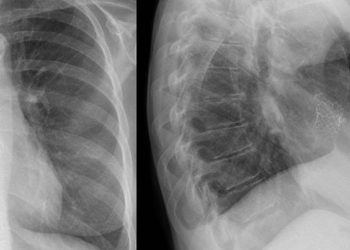Endovascular thrombectomy improves functional outcomes in adults with basilar-artery occlusions
1. In comparison to the best available medical care, a greater proportion of patients with basilar-artery occlusions achieved good or excellent functional outcomes at 90-days with endovascular thrombectomy.
2. Endovascular thrombectomy carried a greater incidence of hemorrhage and procedural complications than usual care, although the overall mortality rate was lower in this group.
Evidence Rating Level: 1 (Excellent)
Study Rundown: Moderate-to-severe strokes associated with basilar-artery occlusions carry a significant mortality and morbidity rate. Endovascular thrombectomy is a technique that involves the mechanical removal of the clot under imaging guidance. For some forms of strokes within larger-vessel arteries, endovascular thrombectomy has been successful. However, the utility of this treatment for basilar-artery strokes is unclear. This study compared endovascular thrombectomy against the best available medical care for basilar-artery strokes. It primarily aimed to understand whether there was a difference in functional outcomes or the safety profile of endovascular thrombectomy in comparison to the best available medical care. Results found that a greater proportion of patients with basilar-artery occlusions were able to achieve good or excellent functional outcomes with thrombectomy in comparison to usual care. Thrombectomy also carried a greater risk of intracranial hemorrhage and procedural complications which can lead to death than the best available medical care, although the overall mortality rate of thrombectomy was lower in the intervention group. The generalizability of this study is a significant limitation. Specifically, it is difficult to generalize the results of this study to patients with basilar-artery occlusions treated after 12 hours, those with a mild stroke, and those who are not of Chinese ethnicity. Although further study into the specific benefit-risk profile of endovascular thrombectomy for various populations is required, this study provided evidence of a promising application of thrombectomy for basilar-artery occlusions which can achieve better functional outcomes than the best available medical care alone.
Click here to read the study in NEJM
In-Depth [randomized controlled trial]: This was a randomized, open-label trial evaluating the functional outcome and safety profile of endovascular thrombectomy for the treatment of moderate-to-severe basilar-artery occlusion compared against the best available treatment. Adult patients with a score of greater than ten on the National Institutes of Health Stroke Scale presenting within 12 hours after the estimated time of occlusion were included. Patients with evidence of intracranial hemorrhage on imaging or with limited pre-stroke functional parameters were excluded. In total, 340 patients were assigned in a 2:1 ratio to receive endovascular thrombectomy (n=226) or control (n=114). The primary outcome of interest was a good functional outcome at 90-days as measured through having a modified Rankin scale score between zero and three. Safety outcomes encompassed intracranial hemorrhage, subarachnoid hemorrhage, or intraventricular hemorrhage leading to death observed on imaging between 24-72 hours after initiation of treatment. Results of the primary analysis found that 46% of patients who received thrombectomy were able to achieve good functional outcomes at 90-days, compared to 23% in the control group (adjusted rate ratio, 2.06; 95% Confidence Interval [CI], 0.2-0.4; p<0.001). Results of secondary analysis found that 33% of patients in the thrombectomy group were able to achieve excellent functional outcomes at 90-days in comparison to 11% in the control group (adjusted rate ratio, 3.17; 95% CI, 1.84-5.46). In terms of safety, the thrombectomy group carried a 37% mortality at 90 days, in comparison to 55% in the control group. Significant complications within the thrombectomy group included symptomatic intracranial hemorrhage (n=12), arterial dissection (n=6), and vessel perforation (n=5). Overall, this study demonstrates that endovascular thrombectomy is more effective than best-available medical care at achieving good or excellent functional outcomes. However, it also carries a higher risk of hemorrhage and procedural complications warranting careful consideration of risks and benefits for the individual patient.
Image: PD
©2022 2 Minute Medicine, Inc. All rights reserved. No works may be reproduced without expressed written consent from 2 Minute Medicine, Inc. Inquire about licensing here. No article should be construed as medical advice and is not intended as such by the authors or by 2 Minute Medicine, Inc.







